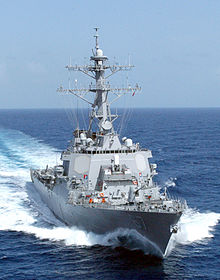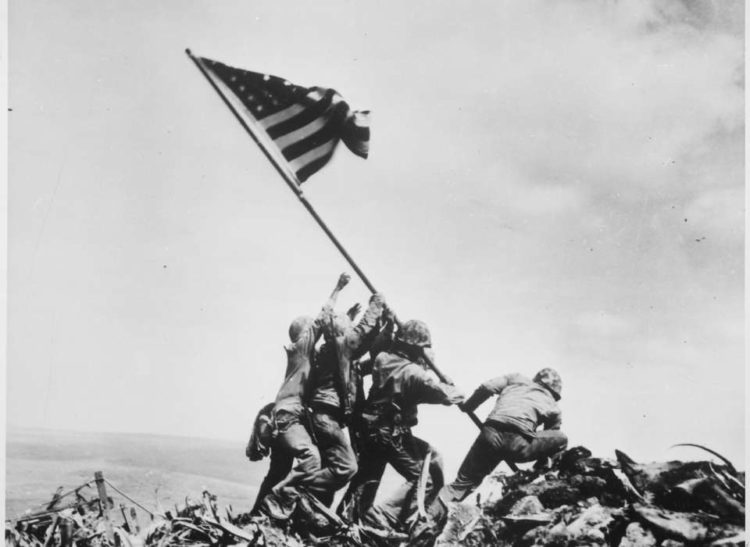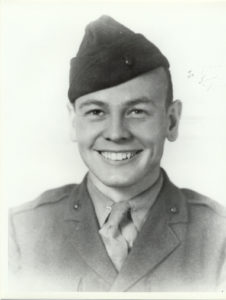After the Marianas campaigns, he resubmitted his request for a change of rating for the third time. Cole pointed out his combat experience and combat record: he felt that he would be of more benefit to the Marine Corps performing line duties than being a bugler. This time his request was approved. He was redesignated Corporal “line” and was subsequently promoted to Sergeant in November 1944.
On February 19, 1945, Sergeant Cole led his machine gun section ashore in the D-Day assault of Iwo Jima. His section was on the initial assault wave when concentrated fire from two enemy emplacements halted his section’s advance. Cole personally moved forward and destroyed them with hand grenades.
His unit once again began to advance until it was pinned down for a second time by enemy fire from three Japanese machinegun emplacements. One of these emplacements was silenced by Cole’s machinegun section. When his machine guns jammed, armed only with a pistol and one hand grenade, Cole made a one-man attack against the two remaining gun emplacements.
He was forced to return to his own lines twice for additional grenades and continued his solo attack under heavy enemy fire until both of the Japanese strong points were eliminated. However, as he was returning to his own squad, a Japanese soldier retaliated and threw a grenade of his own; Cole was killed instantly by the blast.
Sergeant Cole was initially buried in the 4th Marine Division Cemetery on Iwo Jima, but at the request of his father, his remains were returned to the United States to be buried in Parkview Cemetery, Farmington, Missouri.
Medal of Honor Citation:
Cole was posthumously awarded the Medal of Honor, which was presented to his widow on April 17, 1947.
For conspicuous gallantry and intrepidity at the risk of his life above and beyond the call of duty while serving as Leader of a Machine-gun Section of Company B, First Battalion, Twenty-Third Marines, Fourth Marine Division, in action against enemy Japanese forces during the assault on Iwo Jima in the Volcano Islands, 19 February 1945.
Assailed by a tremendous volume of small-arms, mortar and artillery fire as he advanced with one squad of his section in the initial assault wave, Sergeant Cole boldly led his men up the sloping beach toward Airfield Number One despite the blanketing curtain of flying shrapnel and, personally destroying with hand grenades two hostile emplacements which menaced the progress of his unit, continued to move forward until a merciless barrage of fire emanating from three Japanese pillboxes halted the advance.
Instantly placing his one remaining machine gun in action, he delivered a shattering fusillade and succeeded in silencing the nearest and most threatening emplacement before his weapon jammed and the enemy, reopening fire with knee mortars and grenades, pinned down his unit for the second time.
Shrewdly gauging the tactical situation and evolving a daring plan of counterattack, Sergeant Cole, armed solely with a pistol and one grenade, coolly advanced alone to the hostile pillboxes. Hurling his one grenade at the enemy in the sudden, swift attack, he quickly withdrew, returned to his own lines for additional grenades and again advanced, attacked, and withdrew.
With enemy guns still active, he ran the gauntlet of slashing fire a third time to complete the total destruction of the Japanese strong point and the annihilation of the defending garrison in this final assault. Although instantly killed by an enemy grenade as he returned to his squad, Sergeant Cole had eliminated a formidable Japanese position, thereby enabling his company to storm the remaining fortifications, continue the advance and seize the objective.
By his dauntless initiative, unfaltering courage and indomitable determination during a critical period of action, Sergeant Cole served as an inspiration to his comrades, and his stouthearted leadership in the face of almost certain death sustained and enhanced the highest traditions of the United States Naval Service. He gallantly gave his life for his country.

The USS Cole (DDG-67), an Arleigh Burke-class Aegis-equipped guided-missile destroyer was named for Sergeant Cole. Cole is homeported in NS Norfolk, Virginia. The ship was built by Ingalls Shipbuilding and delivered to the Navy on March 11, 1996.











COMMENTS